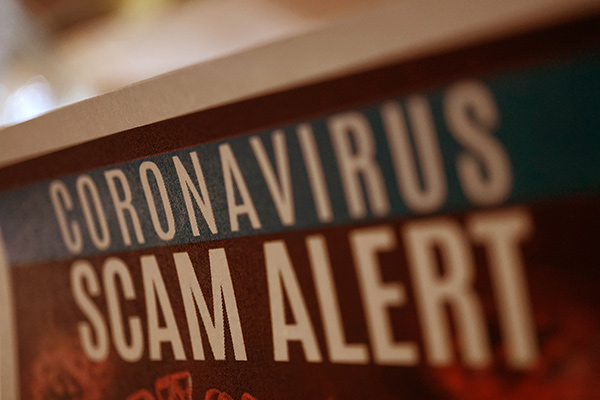Contact Us
To provide feedback on the Community Policing Dispatch, e-mail the editorial board at CPDispatch@usdoj.gov.
To obtain details on COPS Office programs, publications, and resources, contact the COPS Office Response Center at 800-421-6770 or AskCopsRC@usdoj.gov

U.S. Department of Justice
Office of Community Oriented Policing Services
Washington, DC 20530
During a crisis, scammers seek to profit from public panic. Amid the fear and anxiety of COVID-19, a number of fraudulent schemes related to COVID-19 have already been identified. Communities must be vigilant in identifying and publicizing these scams in order to protect their most vulnerable members. State and local authorities have their federal partners’ support and encouragement to investigate and prosecute scammers perpetrating criminal acts. In addition, a number of federal agencies have websites and other resources to support state and local partners during the crisis response with the most updated information.
The central repository for U.S. government resources and information on the COVID-19 (Coronavirus) crisis is https://www.coronavirus.gov/. There is also a Spanish-language site, Respuesta del Gobierno ante el coronavirus. These websites are supported by the Center for Disease Control (CDC) coronavirus medical response website.
Check the Address!
An easy method to verify if an email is fraudulent is to look at the sender’s email address. An email from your bank or cable provider should not have an email address like ‘customerserbnoreaplythis
mailer.idcase6763@tukikc.info’.
Be Smart About Donations!
An easy way to limit the financial damages of scammers is to have one credit card that is solely used for online purchases, donations, and travel. This credit card should not be connected to personal checking and savings accounts. Fraudulent charges on credit cards are limited to $50 maximum for the holder, and cards can be canceled or replaced with minimum effort.
The Department of Justice (DOJ) Report COVID-19 Fraud website includes a list of federal partners that can support local and multijurisdictional investigations of scammers. In addition, the DOJ has identified a number of common scams, and the steps community members can take to avoid being victimized:
- Individuals and businesses selling fake cures for COVID-19. There is no cure for COVID-19. Any medical advice should be verified with one’s personal GP or local medical provider.
- Phishing emails from ‘official’ entities posing as the World Health Organization, the Centers for Disease Control and Prevention, or state health insurance agencies. To verify the information in any official-looking email, open a new webpage and access the agency website directly. Verify that the web address is correct: government agency websites will have domain names that are clear and end in .gov, .org, or .int. Remember: Google is not a government organization!
- Malicious websites and apps about the virus that disable personal devices. Do not open any website address or app embedded in emails, social media, or text messages. Open your device app store and search for the app by name instead.
- Emails from ‘legitimate’ companies flagging fraudulent account activity. Never open any files or links in an email. If you have an account with the company, always open a new browser tab and search for the organization’s official website.
- Emails or other contacts seeking donations fraudulently for illegitimate or nonexistent charitable organizations. Fraudulent organizations can collect donations via legitimate sites such as Venmo or Kickstarter. Always use a credit card for any donations and never provide bank information over the phone or online.
 During the COVID-19 crisis, law enforcement agencies can use social media to engage with the public about scams, along with sharing news updates and positive stories of first responders helping during the crisis. Be sure to share both local and national resources on identifying and reporting scammers, since stories on social media may spread beyond your local area. Law enforcement agencies can work with partners such as the county or state victim services, local U.S. Attorney’s offices, school districts, and local government. Social media promotion with local partners multiplies the positive impact for communities and creates a network of verified, trusted partners.
During the COVID-19 crisis, law enforcement agencies can use social media to engage with the public about scams, along with sharing news updates and positive stories of first responders helping during the crisis. Be sure to share both local and national resources on identifying and reporting scammers, since stories on social media may spread beyond your local area. Law enforcement agencies can work with partners such as the county or state victim services, local U.S. Attorney’s offices, school districts, and local government. Social media promotion with local partners multiplies the positive impact for communities and creates a network of verified, trusted partners.
The federal government maintains a digital services website that provides guidance, including multiple resources on social media engagement during the crisis: Coronavirus (COVID-19) Guidance for U.S. Government Websites and Social Media.
During the COVID-19 crisis, public trust in law enforcement is essential, and the community looks to police and sheriffs to maintain safety and act as an information resource. More than ever during the crisis, law enforcement is integral to the community structure, and the federal government supports state, local, and tribal partners in their work.
Federal Resources
FEMA Coronavirus Rumor Control
FBI Internet Crime Complaint Center
National Center for Disaster Fraud
Building Productive Relationships With Media: Dealing with the New Media Culture During Crisis Situations
Subscribe to Email Updates
To sign up for monthly updates or to access your subscriber preferences, please enter your email address in the Subscribe box.






